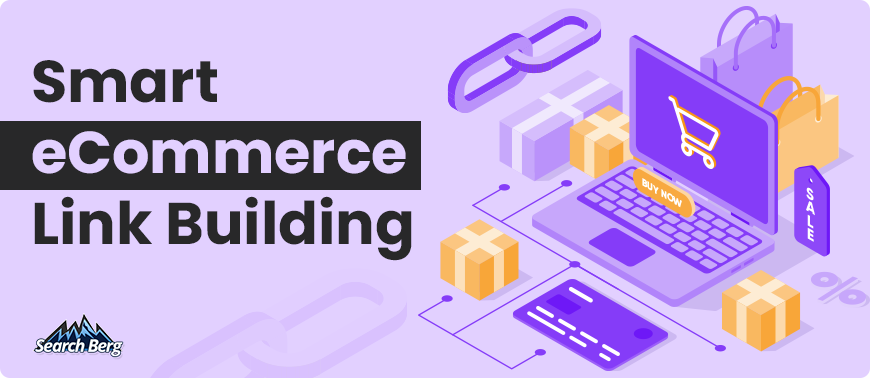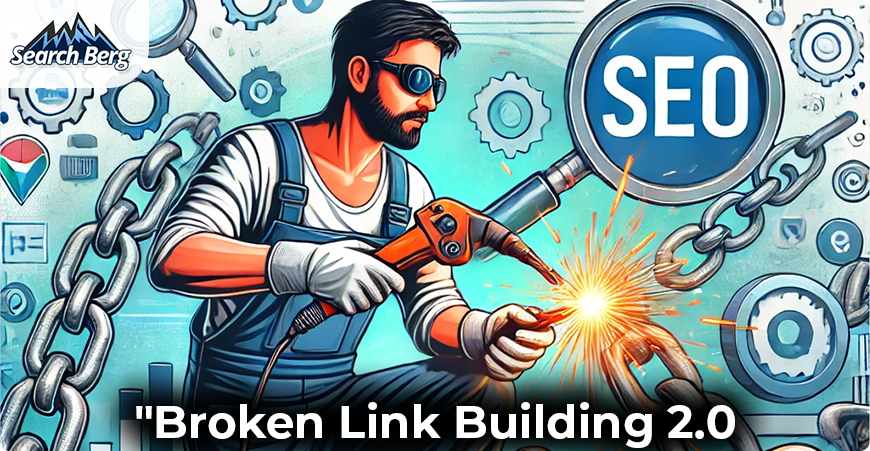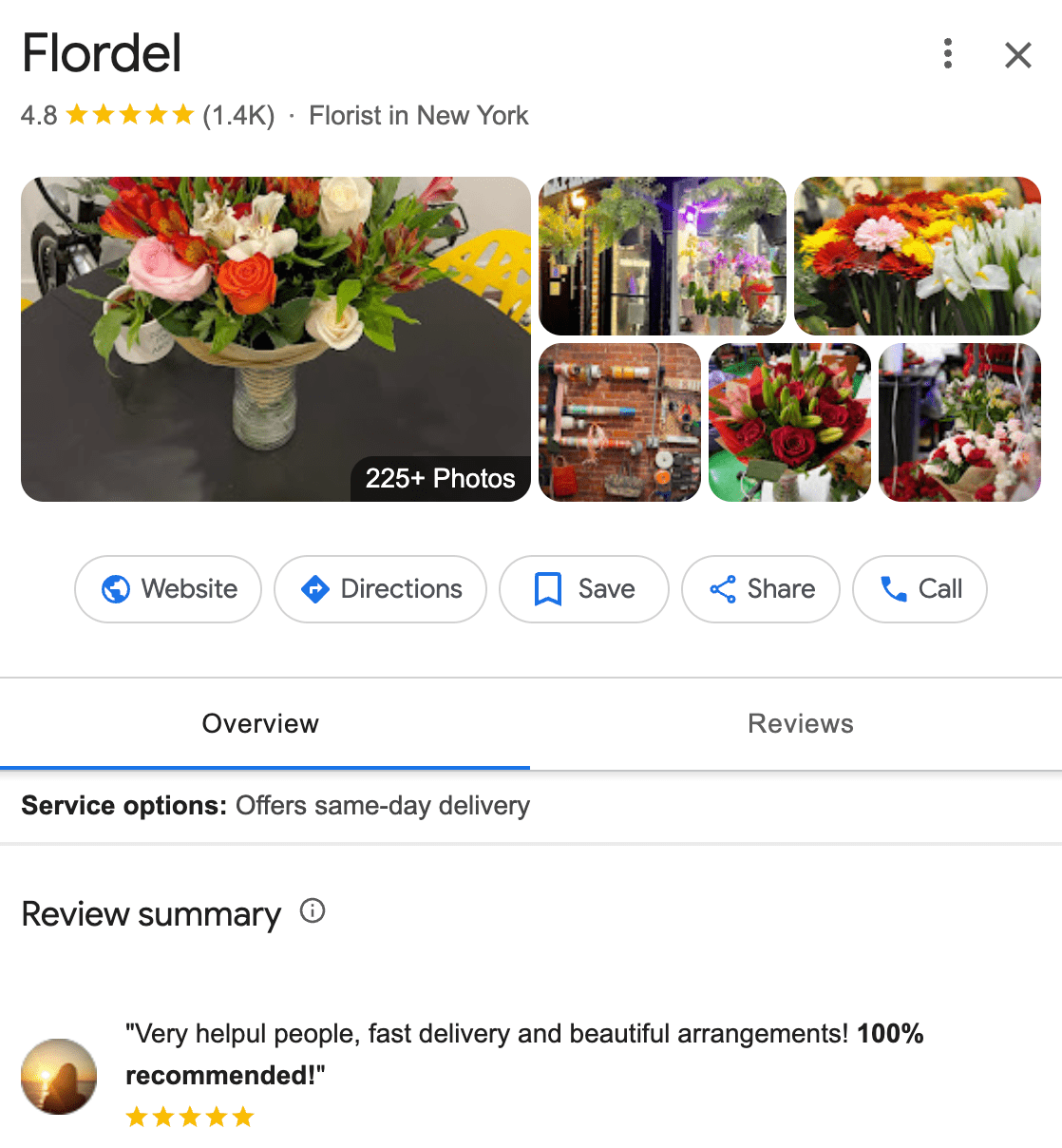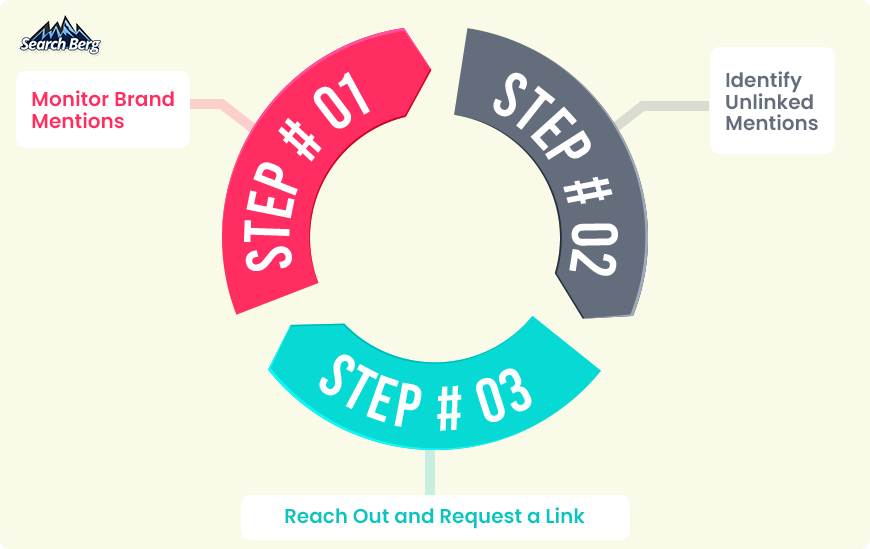Top 8 Link Building Strategies to Boost Your eCommerce Site’s Ranking

Say you’ve poured your heart and soul into creating an amazing eCommerce store. You’ve got stunning product photos, compelling copy, and a seamless checkout experience. But there’s one problem… crickets. Your traffic is flatlining, and your sales are barely a blip on the radar.
Sound familiar? You’re not alone. Many eCommerce businesses struggle to get seen in the vast ocean of online competition. The key to breaking through? Link building for eCommerce sites.
Think of backlinks as digital street signs pointing to your store. The more high-quality signs you have, the easier it is for customers (and Google!) to find you.
This blog is your roadmap to eCommerce link building success. We’ll explore proven strategies to attract powerful backlinks, boost your site’s authority, and drive a surge of organic traffic to your online store.
It’s time to ditch the obscurity and claim your rightful place at the top of the search results. Let’s dive in!
1. Harness the Power of Barnacle SEO

Ever heard of barnacles? Those tenacious little creatures that latch onto whales and ships? Well, barnacle SEO is the process of attaching your eCommerce site to established online entities with massive existing traffic. It’s a clever way to leverage the authority and audience of larger platforms to boost your own visibility.
Here’s how it works:
- Identify Relevant Platforms: Think industry-leading blogs, online directories (like Yelp, TripAdvisor, or industry-specific directories), review sites, and even your competitors (if they have resources or platforms where you can contribute). The key is to find platforms that your target audience frequents and that align with your brand and products.
- Create High-Value Content: Don’t just aim for any link; focus on providing genuine value to the host platform’s audience. Craft insightful guest posts that offer unique perspectives, contribute expert commentary to relevant articles, or write compelling product reviews that go beyond basic descriptions. Think about what the audience wants to know and how your expertise can help them.
- Secure a Link Back to your Site: The ultimate goal is to naturally incorporate a link back to a relevant page on your eCommerce site within your contribution. This could be a link to a specific product page, a relevant blog, or even your homepage. The key is to make the link relevant to the context and valuable to the reader.
Example: If you sell organic skincare products, contribute a guest post to a popular health and wellness blog about the benefits of natural ingredients for sensitive skin. Within the post, you could link back to a specific product page featuring a hypoallergenic moisturizer or a relevant blog post on your site discussing the science behind organic skincare.
See what we mean?
If you want to take it further, consider these tricks:
- Don’t Just Stop at One Platform: Explore multiple opportunities to contribute to different platforms in your niche.
- Build Relationships: Engage with the platform’s community, interact with other contributors, and build relationships with the editors or website owners.
- Track Your Results: Monitor the traffic and backlinks generated from your barnacle SEO efforts to measure their effectiveness and identify areas for improvement.
By strategically leveraging the power of barnacle SEO, you can amplify your eCommerce link building efforts, reach a wider audience, and drive valuable traffic to your online store.
2. Become a Resource Hub with Advanced Content Formats
Okay, you’ve got a blog, but let’s be honest, sometimes blog posts can feel a bit… basic. In the competitive arena of eCommerce, you need to step up your content game to truly stand out and attract those coveted backlinks. It’s time to think beyond the standard blog post format and become a go-to resource hub in your niche.
Think bigger, bolder, and more engaging!
Instead of churning out generic articles, focus on creating content that’s truly exceptional and undeniably link-worthy. This means going deeper, offering more value, and presenting information in a way that captivates your audience.
Here’s how you can transform your eCommerce site into a content powerhouse.
Transform your eCommerce site into a content powerhouse

| Content Format | Description |
eCommerce Example |
|---|---|---|
| In-Depth Guides | Conduct original research, analyze industry trends, and compile your findings into comprehensive, data-driven guides that offer valuable insights and actionable advice. | An online store selling running shoes could create a comprehensive guide on "Choosing the Right Running Shoes for Your Foot Type and Running Style," complete with data, expert interviews, and detailed comparisons of different shoe types. |
| Interactive Tools | Develop interactive tools and calculators that help your target audience solve problems, make informed decisions, or simplify complex tasks. | An eCommerce site selling furniture could offer an interactive room planner tool that allows users to visualize different furniture arrangements in their own space, complete with product recommendations and links to purchase. |
| Visually Stunning Infographics | Transform complex data, processes, or concepts into easily digestible and visually appealing infographics that are perfect for sharing on social media and other online platforms. | An online store selling organic tea could create an infographic that showcases the "Journey of Tea From Leaf to Cup," highlighting the different stages of tea production, the health benefits of various tea types, and tips for brewing the perfect cup. |
| Engaging Videos | Produce high-quality videos that educate, entertain, or inspire your audience. This could include product demonstrations, behind-the-scenes glimpses, or customer testimonials. | An eCommerce business selling makeup could create video tutorials demonstrating different makeup looks using their products, providing step-by-step instructions and showcasing the versatility of their offerings. |
| Downloadable Resources | Offer valuable resources like checklists, templates, eBooks, or white papers that provide actionable advice or solve specific problems for your target audience. | An online store selling gardening supplies could offer a downloadable "Seasonal Gardening Checklist" that provides users with a month-by-month guide to planting, caring for, and harvesting different types of plants, with links to relevant products on their site. |
Why It Works: By offering valuable, unique, and engaging content, you’ll position your eCommerce site as a trusted authority in your niche. This is an excellent way to attract more visitors and increase the likelihood of other websites linking to your resources. The outcome? You’ll end up significantly boosting your eCommerce link building efforts.
3. Leverage the Power of Broken Link Building 2.0

Broken link building is a tried-and-true tactic in the SEO world, but let’s face it, it can feel a bit like a scavenger hunt. Sifting through countless websites to find broken links can be time-consuming, and sometimes, the payoff isn’t worth the effort.
So do you dismiss this technique altogether? No. You give it a 2.0 upgrade, turning it into a powerful eCommerce link building tool that boosts your site’s rankings.
3.1. The Classic Approach (with a Refresher)
At its core, broken link building involves finding broken links (links that lead to 404 error pages) on relevant websites and offering your own content as a replacement.
Here’s a quick breakdown of the traditional process:
- Identify Broken Links on Relevant Websites: Use SEO tools to find broken links on websites in your niche. You can also request your link building service providers to do this for you. At Search Berg, we use our proprietary platform to find broken links.
- Analyze the Broken Link: Determine the type of content the broken link originally pointed to. Was it a product page, a blog post, an infographic, or a resource guide? Understanding the nature of the broken content will help you create a suitable replacement.
- Create Even Better Content: Develop a resource that surpasses the value of the original content. This could involve creating a more comprehensive guide, updating outdated information, or presenting the information in a more engaging format.
- Reach Out to the Website Owner: Inform them about the broken link and offer your content as a replacement. Be polite, concise, and highlight the benefits of replacing the broken link with your resource.
3.2. Broken Link Building 2.0: The eCommerce Advantage
Now, let’s inject some strategic thinking to make this tactic even more effective for your eCommerce site.
- Don’t Just Replace Any Broken Link: Focus on finding broken links that point to resources similar to the products or services you offer. This ensures that your replacement content is highly relevant to the linking page and its audience. For example, if you sell hiking gear, look for broken links on websites that discuss hiking trails, outdoor adventures, or camping equipment.
- Go Beyond a Simple Email: Building genuine relationships is a vital aspect of successful link building for eCommerce websites. Instead of sending a generic email, take the time to engage with the website owner before pitching your content. Comment on their blog posts, share their articles on social media, and participate in their online community. This helps you establish rapport and increases the likelihood of your pitch being well-received.
- Think Long-Term: Broken link building isn’t just about securing a single backlink; it’s about building valuable relationships that can lead to ongoing collaboration and link building opportunities. By consistently providing value and engaging with other website owners, you can cultivate a network of potential link partners.
- Leverage Competitor Analysis: Analyze your competitors’ backlink profiles to identify broken link opportunities. If a competitor’s link is broken, you can swoop in and offer your content as a replacement, potentially capturing valuable backlinks and traffic. At Search Berg, our professional link building team can do this for you.
- Use Broken Link Building to Enhance Your Own Site: Don’t just focus on external websites. Regularly audit your own site for broken links and fix them promptly. This improves user experience and prevents you from losing valuable backlinks.
3.3. Why Broken Link Building 2.0 Works Wonders for eCommerce
Broken link building, when done strategically, offers a wealth of benefits for eCommerce businesses looking to boost their online presence and drive meaningful results.
Unlike some link building tactics that can feel like a one-sided request, broken link building offers genuine value to website owners. You’re not just asking for a link; you’re helping them improve their website by identifying and fixing broken links that negatively impact user experience. This creates a win-win situation where both parties benefit.
By reaching out and offering a solution, you position yourself as a helpful resource and establish a positive first impression. This collaborative approach fosters goodwill and increases the likelihood of securing a backlink, as website owners are more inclined to reciprocate when they feel valued.
It’s also important to note that when you offer high-quality, relevant content as a replacement for a broken link, you demonstrate your expertise and establish your eCommerce site as a trusted resource in your niche. This builds credibility and trust with both website owners and their audience. Website owners are more likely to link to your content if they perceive it as valuable and authoritative.
Broken link building 2.0 is a smart technique that should be leveraged cleverly. When left in the hands of an inexperienced team, this technique can fall flat on its face. In order to extract all the juice from the broken link building 2.0 lemons, partner with an experienced, knowledgeable, and skilled team that knows precisely what its doing.
At Search Berg, our link building services include broken link building 2.0 specifically tailored for eCommerce websites. We identify high-value broken link opportunities, craft compelling replacement content, and build genuine relationships with website owners to secure those coveted backlinks.
Our team understands the nuances of eCommerce link building and can help you navigate the complexities of this strategy to achieve maximum impact. With our expertise, you can transform broken links into powerful assets that drive traffic, boost your rankings, and fuel the growth of your online business.
4. Unleash the Potential of “Skyscraper Content 2.0”

Let’s say you stumble upon a blog post listing the “Top 10 Hiking Backpacks for Beginners.” It’s helpful, but you’re left wanting more. What about advanced hikers? What about backpacks for specific activities like trail running or mountaineering? You crave a truly comprehensive guide that caters to every type of outdoor enthusiast.
Now, imagine you create that ultimate resource: a meticulously researched guide titled “The 50 Best Hiking Backpacks for Every Adventure,” complete with detailed reviews, expert insights, and interactive comparison charts. This is skyscraper content in action: building something so impressive, so valuable, that it towers above the competition and becomes the go-to resource in your niche.
But we’re not stopping at the traditional skyscraper; we’re adding a 2.0 twist to make it even more potent for eCommerce link building. Think of it as constructing a skyscraper with not just steel and concrete, but with SEO magic woven into its very foundation.
This is where the real power lies: in creating content that not only attracts backlinks but also drives targeted traffic, boosts your search rankings, and ultimately fuels the growth of your eCommerce empire.
4.1. The Foundation: Understanding the Skyscraper Technique
The classic skyscraper technique involves three core steps:
- Find Top-Performing Content in Your Niche: Use tools to identify content that’s already generating a lot of eCommerce backlinks and social shares. This indicates that the content is resonating with audiences and has proven link-worthy.
- Create Something Even Better: Don’t just replicate the existing content; aim to surpass it in every way. Go deeper, add more value, include updated information, and present it in a more engaging and user-friendly format. Think about what’s missing from the existing content and how you can fill those gaps.
- Reach Out to Websites Linking to the Original Content: Identify the websites that are linking to the top-performing content and reach out to them, letting them know about your improved resource. Politely suggest that they consider linking to your content instead, as it offers a more comprehensive and valuable experience for their audience.
4.2. Skyscraper Content 2.0
Now, let’s elevate this technique to new heights with a 2.0 approach specifically tailored for eCommerce success:
- Focus on User Intent: Don’t just create longer content for the sake of it. Ensure your skyscraper content truly satisfies the user’s search intent. Dive deep into keyword research, analyze search trends, and understand the underlying questions and needs driving users to seek out this information. By aligning your content with user intent, you increase its value and relevance, making it more likely to attract eCommerce backlinks and drive qualified traffic.
- Promote Your Skyscraper Content: Don’t just build it and expect them to come. Actively promote your skyscraper content across various channels. Share it on social media, engage in relevant online communities, leverage email outreach, and explore paid advertising options to reach a wider audience. The more visibility your content gains, the greater the chances of attracting backlinks and driving traffic to your eCommerce site.
- Optimize for Conversions: While the primary goal of skyscraper content is to attract backlinks, don’t forget its potential to drive conversions. Naturally incorporate relevant calls to action within your content, guiding users towards your product pages or other conversion-focused sections of your site. For example, if you’re creating a guide on “Choosing the Perfect Hiking Boots,” include links to relevant product pages within your content, allowing users to easily explore and purchase the boots you recommend.
- Prioritize Visual Appeal: In the world of eCommerce, visuals matter. Make your skyscraper content visually appealing by incorporating high-quality images, videos, infographics, and other multimedia elements. This not only enhances the user experience but also makes your content more shareable and engaging, increasing its chances of attracting eCommerce backlinks and social shares.
- Go Beyond the Blog Post: While blog posts can be effective, don’t limit yourself to this format. Explore other content formats that align with your niche and audience, e.g., comprehensive guides, interactive tools, downloadable resources, or even video series. By diversifying your content formats, you can cater to different learning styles and preferences, increasing the reach and impact of your skyscraper content.
4.3. Mistakes to Avoid
While the 2.0 approach offers a powerful blueprint for building high-quality backlinks and boosting your eCommerce site’s ranking, there are some common pitfalls that can derail your efforts.
To ensure your skyscraper content reaches its full potential, avoid these mistakes.
To ensure your skyscraper content reaches its full potential, avoid these mistakes.
Simply Creating Longer Content
DescriptionDon't assume that just creating longer content automatically makes it better. Focus on quality over quantity. Ensure your content is truly comprehensive, insightful, and provides more value than existing resources. Don't just add fluff; add substance.
Ignoring User Intent
DescriptionFailing to align your content with user intent is a major mistake. Conduct thorough keyword research and analyze search trends to understand what your target audience is searching for and why. Your skyscraper content should address their specific needs and provide solutions to their problems.
Overlooking Promotion
DescriptionCreating amazing content is only half the battle. Don't just publish it and hope people will find it. Actively promote your skyscraper content across various channels, including social media, email outreach, relevant online communities, and even paid advertising.
Forgetting the Call to Action
DescriptionWhile the primary goal is link building, don't miss the opportunity to drive conversions. Naturally incorporate relevant calls to action within your content, guiding users towards your product pages or other conversion-focused sections of your site.
Underestimating the Importance of Outreach
DescriptionCreating great content is essential, but effective outreach is equally crucial. Don't just send generic emails. Personalize your outreach messages, highlight the value your content offers, and build genuine relationships with website owners.
Copying Existing Content
DescriptionNever plagiarize or simply rehash existing content. Your skyscraper content should be original, insightful, and offer a unique perspective. Focus on adding value and creating something truly exceptional.
Targeting the Wrong Websites
DescriptionDon't waste time reaching out to irrelevant websites. Focus your outreach efforts on websites that are relevant to your niche, have a strong audience, and are likely to link to your type of content.
Being Impatient
DescriptioneCommerce link building takes time and effort. Don't get discouraged if you don't see results immediately. Be patient, persistent, and consistently refine your strategy based on your results.Hire link building services for effective, sustainable results.
5. Forge Strategic Partnerships with Complementary Businesses

Amidst thick eCommerce competition, it’s easy to get caught up in the mindset of “every business for itself.” But what if, instead of battling for every customer, you could collaborate with other businesses to expand your reach and tap into new markets?
That’s the power of strategic partnerships.
Think about it: your ideal customer likely has a range of needs and interests. By partnering with businesses that offer complementary products or services, you can tap into their existing customer base and introduce your brand to a whole new audience. This is an excellent way to expand your reach and enhance your credibility by associating your brand with established and trusted businesses.
Strategic partnerships allow you to share resources, leverage each other’s strengths, and create a synergistic force that drives growth for all parties. And of course, they offer a valuable opportunity to acquire high-quality eCommerce backlinks from relevant and authoritative websites, boosting your eCommerce site’s visibility in search results.
So… how does it work?
Start by identifying potential partners.
Look at:
- Complementary Businesses: The most obvious starting point is to identify businesses that offer products or services that complement your own. Think about the needs and interests of your target audience. What other products or services might they be interested in? For example, if you sell coffee beans, potential partners could include cafes, coffee equipment retailers, or even bakeries.
- Industry Associations and Organizations: Industry associations and organizations are a great place to connect with other businesses in your niche. These organizations often host events, webinars, and networking opportunities that can help you forge valuable partnerships.
- Online Communities and Forums: Engage in online communities and forums related to your industry. This allows you to connect with other businesses, learn about potential partnership opportunities, and build relationships with key players in your niche.
Once you’ve identified potential partners, explore various co-marketing opportunities to create a harmonious blend of your brands.
This could involve:
- Guest Blogging: Contribute valuable content to each other’s blogs, naturally incorporating links back to your respective websites.
- Joint Webinars:Host webinars together on topics relevant to both audiences, promoting each other’s brands and offerings.
- Co-Created Content: Collaborate on creating valuable resources, e.g., eBooks, guides, or infographics, that can be promoted by both partners.
- Cross-Promotions: Feature each other’s products or services in your email newsletters, social media posts, or even physical stores (if applicable).
- Joint Contests and Giveaways: Host contests or giveaways that promote both brands and encourage engagement from both audiences.
- Affiliate Partnerships: Promote each other’s products or services through affiliate programs, earning commissions on referrals.
It all comes down to that golden backlink.
From the outset, be transparent with your partners about your goals for the collaboration, including your desire to acquire backlinks. This ensures everyone is on the same page and working towards a common objective.
Provide your partners with the exact URLs you want them to link to, along with suggested anchor text. This simplifies the process for them and increases the likelihood of securing the backlinks you desire.
By being proactive, communicative, and genuinely valuable partners, you can ensure that your collaborative efforts translate into high-quality backlinks that boost your eCommerce site’s authority and visibility in search results.
After all, a rising tide lifts all boats, and in the world of eCommerce, strategic partnerships are the key to riding the waves of success together.
6. Leverage the Power of Local SEO and Citations
While the internet connects us globally, many eCommerce businesses thrive by serving a local customer base. If your business has a physical presence or caters to a specific geographic area, optimizing for local SEO is essential for attracting customers nearby and building a strong online presence within your community.
Think of it this way: when someone searches for “best coffee shops near me” or “florists in [your city],” you want your eCommerce business to appear prominently in those local search results. Local SEO is the key to making that happen. It’s about optimizing your online presence to attract customers in your area, driving local traffic to your website, and building valuable eCommerce backlinks from local citations.
6.1. The Google Business Profile Magic!
Your Google Business Profile (GBP)is often the first thing customers see when they search for your business or businesses like yours in your area.
This is what it looks like:

Claiming and optimizing your GBP is essential for local SEO success.
- Ensure Accuracy and Completeness: Fill out every section of your GBP with accurate and up-to-date information, including your business name, address, phone number, website, hours of operation, and categories.
- Craft a Compelling Business Description: Highlight your unique selling points, target keywords, and include a call to action encouraging customers to visit your website or physical store.
- Showcase Your Offerings with Visuals: Upload high-quality photos of your products, storefront, and team to make your GBP visually appealing and engaging.
- Encourage Customer Reviews: Positive reviews not only boost your credibility but also play a role in local SEO rankings. Encourage satisfied customers to leave reviews on your profile.
- Engage with Your Audience: Respond to reviews, answer questions, and post updates to keep your GMB profile active and engaging.
6.2. Local Citations Matter
Local citations are equally important. These are online mentions of your business that include your NAP (Name, Address, Phone Number) information. These citations can appear on online directories, industry-specific platforms, local business associations, and even social media platforms.
Building consistent and accurate local citations is vital for local SEO.
- Prioritize Quality Over Quantity: Focus on listing your business on reputable and relevant directories and platforms.
- Ensure NAP Consistency: Maintain consistent NAP information across all your online citations. Inconsistent information can confuse search engines and harm your local rankings.
- Diversify Your Citation Sources: Explore a variety of citation sources, including general business directories (Yelp, Yellow Pages, Bing Places), industry-specific platforms, and local business associations.
- Leverage Data Aggregators: Data aggregators like Localeze and Infogroup distribute your business information to various online directories, streamlining the citation building process.
- Monitor Your Citations: Regularly monitor your citations to ensure accuracy and address any inconsistencies or duplicate listings.
A strong Google Business Profile and a robust network of local citations can attract backlinks from other websites and directories. When other websites reference your business, they often link to your Google Business Profile or your website, further strengthening your eCommerce backlink profile and boosting your site’s authority. This interconnected web of online signals contributes to a stronger online presence and improved search rankings for your eCommerce site.
Want sustainable results?
Turn to professional backlink building service.
At Search Berg, we meticulously optimize your Google Business Profile, ensuring accuracy, completeness, and engaging visuals to attract local customers. We build a robust network of local citations across relevant directories and platforms, strengthening your online presence and boosting your visibility in local search results.By combining these efforts with a comprehensive SEO strategy, we help your eCommerce site rank higher, drive targeted local traffic, and achieve sustainable growth within your community.
7. Capitalize on the Power of Product Reviews
Forget dry eCommerce link building tactics that feel like pulling teeth. Imagine a strategy that boosts your site’s authority and amplifies your brand’s message through authentic voices and genuine experiences.
That’s the magic of leveraging product reviews for link building.
Every time a customer shares their experience with your product, they’re not just leaving a star rating; they’re creating a ripple effect that extends far beyond your product page. These reviews become powerful testimonials, building trust with potential customers, attracting valuable backlinks from authoritative websites, and driving targeted traffic that converts.
7.1. Beyond Star Ratings: The Multifaceted Value of Product Reviews
While star ratings provide a quick snapshot of customer satisfaction, the real power of product reviews lies in the detailed feedback they offer. These authentic voices provide valuable insights into your products, address potential concerns, and build confidence among hesitant buyers.
But the benefits extend far beyond social proof.
Product reviews, when strategically leveraged, can become powerful magnets for attracting high-quality backlinks to your eCommerce site.
Here’s how it works:
- Product Reviewers and Bloggers: Your eCommerce Link Building Allies: Identify influential product reviewers and bloggers in your niche who have a strong online presence and an engaged audience. Reach out to them, offering free samples of your products in exchange for an honest review.
- Make Linking Irresistible: Provide reviewers with all the necessary information about your product, including detailed specifications, high-quality images, and even unique selling points. Make it incredibly easy for them to link back to your product pages by providing direct URLs and suggesting relevant anchor text.
- Engagement is Key: Don’t just send a product and disappear. Engage actively with reviewers and their audience. Respond to comments, answer questions, and participate in discussions. Building relationships with reviewers can lead to ongoing collaboration and continued backlink opportunities.
7.2. Example in Action
Imagine you sell high-performance hiking boots. You identify a popular outdoor adventure blog called “The Gear Guru,” known for its in-depth reviews and passionate audience. You reach out to the blogger, offering a free pair of your latest boots in exchange for an honest review.
The blogger, impressed with the boots’ quality and performance, publishes a detailed review on their blog, highlighting the key features, benefits, and their personal experience on the trails. Within the review, they include a link directly to your product page, encouraging their readers to learn more and purchase the boots.
This single review drives targeted traffic to your site and establishes trust with potential customers. Furthermore, the backlink from “The Gear Guru” boosts your site’s authority in the eyes of search engines, improving your rankings and driving organic traffic.
This is the sheer power of product reviews in action.
8. Turn Brand Mentions into Valuable eCommerce Backlinks
Let’s say a popular lifestyle blog publishes an article featuring your innovative new yoga mat, praising its eco-friendly materials and unique design. They rave about its comfort and durability, but… they forget to link back to your website.
This scenario, while frustrating, presents a golden opportunity. It’s time to turn those unlinked brand mentions into valuable backlinks!
8.1. A 3-Step Process
In the vast expanse of the internet, your brand is likely being mentioned in various corners without you even realizing it. These unlinked mentions, while seemingly insignificant, are a hidden treasure trove for link building for eCommerce sites. They represent websites that are already talking about your brand, products, or services: the perfect candidates for acquiring backlinks.
How should you go about this?
Follow these three steps:

- Monitor Brand Mentions: The first step is to identify where your brand is being mentioned online. Several tools can help you with this, including Google Alerts (a free tool for setting up alerts for specific keywords) and Search Berg’s comprehensive in-house software. Speak with our link building service providers for more information.
- Identify Unlinked Mentions: Once you’ve identified brand mentions, filter them to find those that don’t include a link back to your website. This can be done manually or by using tools with this feature.
- Reach Out and Request a Link: Reach out to the website owners and politely request that they add a link to your site. When crafting your outreach email, personalize your message, keep it concise, highlight the value of adding a link, provide the exact URL and anchor text, and be polite and appreciative.
Pro Tip: Consider offering something in return for adding a link, e.g., a discount code for their readers or a social media shoutout. This can increase the likelihood of securing the backlink.
8.2. Why This Strategy is a Link Building Gem for eCommerce
- High Success Rate: Since the website is already mentioning your brand, they are more likely to be receptive to adding a link, especially if you provide value in return.
- Builds Relationships: Reaching out to website owners and engaging with them can help you build valuable relationships that can lead to future collaborations and link building
- Improves Brand Visibility: By securing backlinks from websites that are already talking about your brand, you increase your brand’s visibility and reach a wider audience.
- Enhances Credibility: Backlinks from relevant websites signal to search engines that your eCommerce site is trustworthy and authoritative, boosting your credibility and improving your search rankings.
- Drives Targeted Traffic: When websites link to your site, they drive targeted traffic from visitors who are already interested in your brand or products. This can lead to increased sales and conversions.
The obvious takeaway? This is a powerful approach that can take your eCommerce site to new heights. However, keep in mind that website owners are not obligated to link to your site. Approach them with respect and appreciation, highlighting the mutual benefits of adding a link.
If a website owner is hesitant to add a link, be open to negotiation. Perhaps you can offer to write a guest post for their site in exchange for a link, or collaborate on a joint promotion. However, as we mentioned earlier, don’t push. Be courteous, respectful, and polite.
Level Up Your eCommerce Link Building Game with Search Berg
You’ve explored the depths of advanced link building strategies. Now, it’s time to take your eCommerce site to the next level.
At Search Berg, we understand the intricacies of eCommerce link building and its impact on driving organic traffic, boosting search rankings, and fueling sustainable growth. Our link building experts craft bespoke strategies tailored to your specific needs and goals, ensuring your eCommerce backlink profile is robust, authoritative, and primed for success.
If you’re looking for professional link building services to take your online presence to new heights, Search Berg is your trusted partner. We also provide the full spectrum of eCommerce SEO services across the nation.














